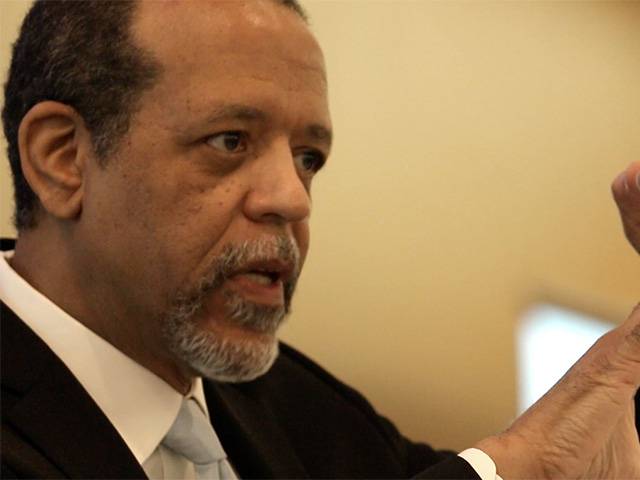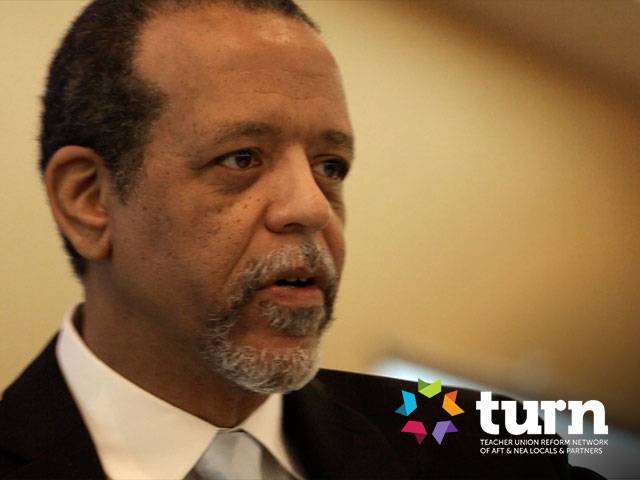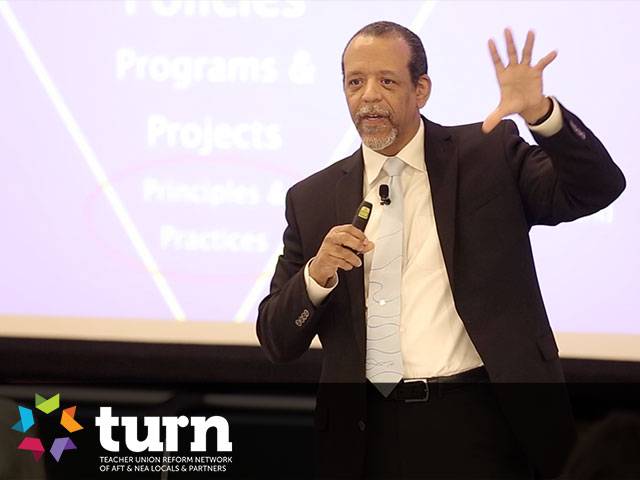Video 6 Author and Harvard professor Ron Ferguson discusses the impact of a teacher on the lives of students. He shares that the purpose of a teacher is to protect and serve children through leadership. He encourages teachers to stand up for students, even at times where they might feel like they are in the minority. He talks about the collective impact that educators can have if they focus on the big picture of education.
Video Transcript
[00:00:08] Every child in your class has a parent and a family and ancestors who had dreams of what their lives are going to be like. We think about the responsibility to do what we need to do today. There are folks like that who are behind us who had dreams and wishes for what your life would be like and what your children's lives would be like. So when we ask, "Why?" Because that's what we're supposed to be doing. Right? [00:00:32] We may be members of unions that have all kind of political bargaining kinds of things we need to do, and that's part of what we need to do. But we're also grownups. We're citizens. We're parents, and we have responsibility to be grownups, just like the people behind us who were grownups when we were kids had a responsibility to be grownups, and to do what grownups do, to take care of kids. And we need to share that and have that sensibility permeate the communities we serve, and we have people who don't buy that. We need to face them down. If you've got somebody who's talking and behaving in ways that does not serve children well, we need to get in their face and say, "Will you please help me understand that? What are the implications of what you just said for the welfare of the children we serve?" All right? [00:01:31] We talk about having very low turnouts often in union elections. Maybe, because in the places that have those low turnouts, there may be a lot of people who are just preoccupied with how they're going to serve the kids. They don't want to deal with the union politics. We need to activate those people and say no, we're all about serving kids. We're going to protect our professional interest, but we're also going to serve kids. We become professional organizations that are really about professionalism at the same time as you're taking care of the collective bargaining needs. It takes leadership. [00:02:10] I'm sure everybody's been in rooms where a minority thinks they are a majority and stands up and speaks for everybody in a way that you don't agree with, but nobody who doesn't agree says anything. So everybody sitting there thinks they're a minority, but they're actually in the majority. And the minority who is doing all the talking thinks they're in the majority. So we've got to have some courage to serve children. How many of you've heard of Urie Bronfenbrenner? A few folks. He has a way of thinking about the social ecology in which kids live, in which all the different settings where they spend time. Each work well as individual settings, but they're networked together in support of one another. It's called the meso-ecology. It's a network of micro-ecologies. [00:02:58] And then there are places where the adults get together and make decisions that affect what goes on in there. Those are part of the exo-ecology, and then there's an overall system of beliefs and understandings and language and stereotypes and so on that is the cultural blueprint. And it's like the macro-ecology, and this whole system fits together where kids live in all these different settings. They migrate and navigate between them, and it's all working really well. And the adults are making good decisions in support of that, and it's embedded in an ideological system that's macro-ecology where we all have a shared commitment to collect kids. [00:03:35] And what we want to do is cultivate in our communities this macro-ecological commitment, this ideology that we have a collective responsibility to take care of kids and do it well and to work with one another on this. And we hold one another accountable for that. And so even as I start it with a "How do we use the word excellence in combination with equity?" It's you want certain things, the way you say things that everybody's heard it said that way. Everybody knows what you mean when you say it or kind of on the same page. And the problem is, in most communities, it's nobody's job to put that big picture into place. [00:04:09] I have students in my classes that combine students from the Kennedy School of Government, the Graduate School of Education, sometimes the Law School, sometimes the Business School, all in the same room. And each of them has kind of a narrow conception of their role. So when you talk about getting the whole macro-ecological picture in place, you know, the people who were planning to be school counselors are thinking that's kind of an academic abstraction. Because what I really want to know is how I'm going to work with these individual kids to help them work through their issues. [00:04:39] Everybody's got their own little niche that they plan to work in. It's somebody else's job to think about how it all fits together. The fact is it's nobody else's job. So it's kind of everybody's job. How many of you have ever heard of Collective Impact? Collective Impact is sort of a new movement that's starting to move around the country. An organization called Strive Together is probably, in my view, the leading organization. If you Google Strive Together, it'll take you to a website that there's a network of cities around the country that are coming together to try to align the commitments of the people who control resources with what we are to call backbone organizations that help to kind of coordinate and be on top of everything. And then you've got front line organizations that work with families and so on. [00:05:27] And so they're really trying to put it all together. It's very political. It's not easy to do, but that's one place where I say it's nobody's job to think about the whole thing. Backbone organizations are kind of trying to take that on. They're outside of government because you want them to be long-term. You want them to survive administrations so you don't the mayor to capture it necessarily, but you want the mayor to endorse it. In any case, there's this big picture that we all kind of have some responsibility for helping to maintain.









